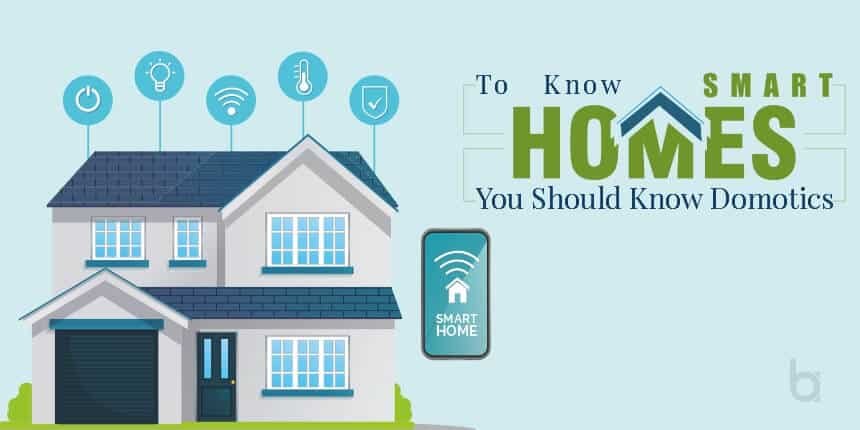It is a known fact that the state-of-the-art technologies like artificial intelligence (AI), machine learning (ML), cloud, virtual reality (VR), internet of things (IoT), big data, etc. have morphed human life into a completely new one. With the help of these technological innovations, routine tasks are now being accomplished with less effort and little time. This demonstrates how humans are embracing these aforesaid technologies in their personal and professional lifestyle to improve the quality of life.
Smart home technology has been the subject of science fiction stories for decades. It has been budding over time and finally is in the limelight now. But, there are a lot of questions like what is smart home technology? How is it beneficial for humans? What companies are working in this sector? What are the new advancements? Etc. To answer these questions, let us explore the smart home technology.
What is Smart Home Technology or Domotics?
Typically, smart home technology is referred to as home automation or domotics. The word domotics originated from a Latin word called “Domus”, which means home. It is a tool, which allows users to control, surveillance, and operate any appliances of their home effortlessly and remotely. This tool converts an ordinary home into a smart home where all the devices and appliances are connected. They can talk to each other and have their own “intelligence”. The key purpose of home automation is to increase the living and comfort quality of the domestic space and give users peace of mind. The field of Domoticsincludes the highly sophisticated sensors and controls that monitor and automate temperature, lighting, security systems, and many other functions. Through their smartphones, users can check the status of the home appliances from a remote location in real-time.
Making Human Lives Comfortable and Convenient
The most crucial benefit of home automation is that it offers comfort, luxury and peace of mind to users by allowing them to surveillance their homes remotely. At the same time, it helps them neutralizing dangers such as a front door left unlocked or a forgotten coffee maker left on. The smart home technology is also beneficial for elderly people. This technology helps them to remember their daily tasks, which often they tend to forget such as taking medications, drinking water, brushing their teeth, and more. As a result, it enables them to act more independently, which improves their overall. Unsurprisingly, the smart home systems can accommodate user preferences also. For instance, as soon as you arrive at home, the front door will open automatically, the light will turn on, and your favorite songs will start playing on your smart speakers.
Various Types of Devices and Appliances Controlled by Human
In the pioneer technological world, every aspect of human life is interlinked with technology and digital devices. So, here are some of the real-time applications of home automation. Everyone knows about Amazon’s Alexa, Google Home, and Apple’s Siri. They are virtual voice-controlled assistants that allow users to control their smart home products by speaking simple commands. Some other tasks they perform are adjusting a smart LED, bringing up-to-date information about the weather, traffic or news, playing music, making a list, replying to the asked questions, etc. Besides this, there are other smart devices and appliances, which are used by people today. These include lighting control, HVAC, lawn/gardening management, smart home appliances, improved home safety and security, home air quality and water quality monitoring, natural language-based voice assistants, better infotainment delivery, AI-driven digital experiences, smart switches, smart locks, and smart energy meters.
Position of Leading Players in the Global Market
As previously mentioned, home automation is gaining popularity in the global market. Many observers speak of the smart-home market as if it were a single entity. But, the analysis of companies in the sector founded over the past ten years shows that subsectors have peaked at different times in terms of investment value and volume. According to the International Data Corporation (IDC), double-digit growth expected in the smart home market. The global market is expected to grow 26.9% year over year in 2019 to 832.7 million shipments.
Moreover, Honeywell, Samsung, Johnson Controls, Schneider Electric, and Ingersoll-Rand plc.are some of the leading players. In this smart home technology game, Samsung is leading the competition with revenue of $213 billion. The United States leads smart home technology usage with 32% followed by Norway, Estonia, Denmark, and Sweden. Nevertheless, Amazon and Google are not far behind in this game. In 2018, Amazon and Google focused on getting their products into consumers’ homes. For the current year, they aim to tie up various devices together to form a more cohesive experience and more importantly, layering in additional services.
From these statistics, the conclusion rises that the domotics sector is going to advance and thrive more in the coming years. Witnessing such advancement, HubSpot assembled a list that contains smart devices and systems. It predicated that these smart devices and systems would enhance human life and make their lifestyle comfortable. Now, it depends upon the human, which smart home technology they want to use and see in their homes.

















